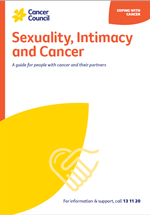- Home
- Cancer Information
- Managing side effects
- Sexuality, intimacy and cancer
- Overcoming specific challenges
- Adapting to life with a stoma
Adapting to life with a stoma
Some types of surgery for bowel, anal or bladder cancer create a stoma – an opening in the abdomen that allows faeces (poo) or urine (pee or wee) to flow through and be collected in a small plastic bag. Sometimes a stoma is needed for only a short time, but in other cases it is permanent.
Having a stoma can affect your confidence and self-image, though a stoma often causes more embarrassment and distress to the person with a stoma than their partner. Getting used to looking after the stoma will help you feel more confident. Sexual activity for people with a stoma may need a little more planning but can still be satisfying and fulfilling.
Tips for sex if you have a stoma
- Change the bag and check the seal before having sex. This may help with worries about leaking.
- If you prefer, cover your bag with fabric or fold it in half and cover with a cummerbund to prevent the plastic clinging to your skin or the bag from flopping around. This can also help to keep it out of sight if that is a concern.
- Wear clothing that makes you feel good, such as a mini-slip, short nightgown or nightshirt, specially designed underwear or boxer shorts.
- Try sex in the bath/shower.
- After a heavy meal, wait for 2–3 hours before having sex.
- Talk to your stomal therapy nurse about learning irrigation to allow you to use a stoma cap or a small pouch (a “mini”) during sex.
- Use pouch deodorants or wear perfume to help control any odours.
- Allow your partner to see or touch the stoma.
- Contact a stoma association for support. Find one near you at The Australian Council of Stoma Associations.
→ READ MORE: Adapting to life after a brain tumour
Podcast: Sex and Cancer
Listen to more of our podcast for people affected by cancer
More resources
Dr Margaret McGrath, Head of Discipline: Occupational Therapy, Sydney School of Health Sciences, The University of Sydney, NSW; Yvette Adams, Consumer; Dr Kimberley Allison, Out with Cancer study, Western Sydney University, NSW; Andreea Ardeleanu, Mental Health Accredited Social Worker, Cancer Counselling Service, Canberra Health Service, ACT; Kate Barber, 13 11 20 Consultant, Cancer Council Victoria; Dr Kerrie Clover, Senior Clinical Psychologist, Psycho-Oncology Service, Calvary Mater Newcastle, NSW; Maree Grier, Senior Clinical Psychologist, Royal Brisbane and Women’s Hospital, QLD; Mark Jenkin, Consumer; Bronwyn Jennings, Gynaecology Oncology Clinical Nurse Consultant, Mater Health, QLD; Dr Rosalie Power, Out with Cancer study, Western Sydney University, NSW; Dr Margaret Redelman OAM, Medical Practitioner and Clinical Psychosexual Therapist, Sydney, NSW; Kerry Santoro, Prostate Cancer Specialist Nurse Consultant, Southern Adelaide Local Health Network, SA; Simone Sheridan, Sexual Health Nurse Consultant, Sexual Health Services – Austin Health, Royal Talbot Rehabilitation Centre, VIC; Prof Jane Ussher, Chair, Women’s Heath Psychology and Chief Investigator, Out with Cancer study, Western Sydney University, NSW; Paula Watt, Clinical Psychologist, WOMEN Centre, WA.
View the Cancer Council NSW editorial policy.
View all publications or call 13 11 20 for free printed copies.
Need to talk?
Support services
Coping with cancer?
Speak to a health professional or to someone who has been there, or find a support group or forum
Life after cancer treatment
Webinars, exercise and nutrition, sexuality programs, and back-to-work support
Cancer information
Your coping toolbox
Strategies for managing difficult situations during and after cancer treatment
View our publications
Guides and fact sheets for people with cancer, their families and friends

